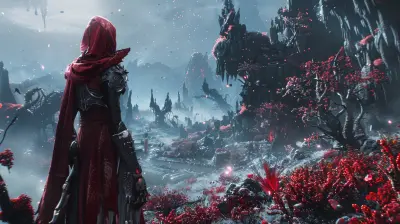Community Reactions to Microtransactions: How Gamers Are Voicing Their Opinions
4 June 2025
Video games have come a long way from pixelated screens and cartridges to sprawling digital worlds and intricate narratives. But, over the past decade, there’s one topic that has caused heated debates across online forums, social media, and even within the gaming community itself: microtransactions. If you’ve been anywhere near the gaming world recently, you’ve probably heard gamers talking—often yelling—about them. But what exactly is behind this uproar? And how are players voicing their concerns? Let’s dive into the nitty-gritty of this fiery topic.
What Are Microtransactions?
First things first, let’s break it down. Microtransactions are those little (or sometimes not-so-little) purchases you can make within a game after buying—or, in some cases, downloading—the game itself. These can range from cosmetic upgrades, like character skins or weapon designs, to game-enhancing items, such as powerful weapons or currency packs.On paper, it sounds harmless, right? You pay a few bucks for something that enhances your gaming experience. But in practice, microtransactions have split the gaming world in two. For some, they’re a necessary evil to keep games alive. For others, they’re the digital equivalent of being nickel-and-dimed. So, what’s the deal?
The Rise of Microtransactions: Necessary Evolution or Greedy Practice?
To understand the backlash, we’ve got to look at where all this started. Back in the day, we’d buy a game off the shelf, take it home, and play it. That was that. But with the rise of free-to-play games and the increasing cost of game development, publishers needed new ways to make money. Enter microtransactions.Games like League of Legends, Fortnite, and Apex Legends popularized the “free-to-play” model, allowing players to enjoy core gameplay entirely free while offering optional purchases. And hey, many gamers were fine with this setup—after all, they weren’t forced to pay a cent if they didn’t want to.
But then publishers began pushing the limits. Full-priced games (looking at you, $70 AAA titles) started including microtransactions, blurring the lines between additional content and straight-up cash grabs. Suddenly, players felt like they were paying twice: first at the store, and then, again, inside the game.
Gamer Backlash: Why Players Are Fed Up
It didn’t take long for the backlash to bubble to the surface. Forums like Reddit, YouTube channels, and even Twitch streams became battlegrounds, with players venting their frustrations. But what exactly are they complaining about? Let me break it down.1. Pay-to-Win Shenanigans
One of the biggest gripes is the dreaded “pay-to-win” model. Nobody enjoys grinding for hours to unlock a new weapon, only to find out another player skipped the grind by swiping their credit card. It’s like running a marathon only to be overtaken by someone on a motorbike. Fair? Not really.2. Loot Boxes and Gambling Allegations
Then there’s the loot box controversy. Loot boxes offer randomized rewards for a fee, and while they might seem innocent, critics argue they’re dangerously close to gambling. After all, you’re spending money on a chance to get what you want—not a guarantee. Countries like Belgium and the Netherlands have even banned them altogether.3. Content Locked Behind Paywalls
Gamers also feel like they’re being locked out of content they already paid for. Remember the days of unlocking skins, characters, or levels just by playing the game? With microtransactions, a lot of that content gets locked behind a price tag, leaving many players with FOMO (fear of missing out)—unless they’re willing to open their wallets.4. Progression Impacts
When microtransactions affect progression—making it feel like a slog to level up unless you pay—the experience becomes frustrating. Games like Star Wars Battlefront II faced massive criticism for this exact reason, earning EA the most downvoted Reddit comment in history. Ouch.
How Gamers Are Voicing Their Opinions
If there’s one thing the gaming community is great at, it’s making noise. And boy, have they let publishers know how they feel about microtransactions. Here’s how gamers have been fighting back:1. Review Bombing
When players are angry, they take to platforms like Steam or Metacritic to review bomb a game. This involves leaving low ratings en masse, tanking a game’s score to send a clear message to publishers. While controversial, it’s undeniably effective.Case in point: The backlash to Blizzard’s Diablo Immortal. The game’s aggressive microtransactions led to a flood of negative reviews, making it one of the lowest-rated Blizzard games ever.
2. Viral Outrage on Social Media
Social media platforms like Twitter (well, X now, I guess) are buzzing with hashtags, memes, and callouts aimed at greedy monetization practices. Gamers aren’t holding back, and their complaints often go viral, forcing publishers to address the criticism.3. Boycotting Games
Another tactic? Hitting publishers where it hurts: their wallets. Some players outright boycott games that adopt predatory practices, refusing to buy or play them. While it’s hard to gauge how many players actually follow through on boycotts, the publicity surrounding them pressures publishers to rethink their strategies.4. Petitions and Community Movements
Platforms like Change.org have hosted numerous petitions from gamers demanding better practices. While petitions themselves may not always lead to change, they rally the community and show the gaming industry just how widespread the discontent really is.Publishers Respond: Are They Listening?
So, are publishers getting the message? Kind of. Some have adjusted their strategies in response to backlash. For example:- CD Projekt Red with Cyberpunk 2077: After being under fire for releasing a buggy product, the company committed to releasing additional content for free in an attempt to rebuild goodwill. While not exactly tied to microtransactions, it’s a clear example of how publishers can pivot after upsetting their community.
- EA Backpedaling on Loot Boxes: After the Star Wars Battlefront II fiasco, EA temporarily removed loot boxes from the game, promising to overhaul the system. Though there’s still work to be done, it was a small step in the right direction.
Not all publishers are willing to budge, though. Some double down on in-game purchases, banking on the fact that big spenders (often called “whales”) will generate enough revenue to outweigh any bad PR.
Is There a Middle Ground?
Here’s the million-dollar question: can gamers and publishers find common ground on microtransactions? It’s tricky, but not impossible. Some games have struck a balance that keeps both sides relatively happy.For example:
- Games like Fortnite offer purely cosmetic microtransactions, ensuring that players who spend money don’t get an unfair advantage.
- Single-player games like The Witcher 3 focus on creating robust experiences without nickel-and-diming players, proving that great games can still be profitable without microtransactions.
Ultimately, it boils down to transparency and fairness. If publishers are upfront about what’s being sold and ensure those purchases don’t harm gameplay, the community tends to respond more positively. But let’s be real—trust between gamers and publishers is fragile at best, and one misstep can reignite the flames.
The Future of Microtransactions: Where Do We Go From Here?
Like it or not, microtransactions aren’t going anywhere. They’re a major revenue stream in an industry that’s only growing more expensive to sustain. However, if publishers want to avoid alienating their audience, they need to tread carefully. Gamers have proven time and time again that they’re not afraid to call out greedy practices.For the gaming community, staying vocal is key. Whether it’s through social media, forums, or even good ol’ memes, making noise is the best way to ensure publishers know what players want—and, more importantly, what they don’t want.
The bottom line? Microtransactions are here to stay, but the way they’re implemented can make or break a game’s reputation. And as long as gamers keep speaking up, publishers will have no choice but to listen.
all images in this post were generated using AI tools
Category:
MicrotransactionsAuthor:

Avril McDowney
Discussion
rate this article
3 comments
John Jenkins
It's important to listen to gamers' concerns; their passion shapes our gaming communities positively.
June 20, 2025 at 4:38 PM

Avril McDowney
Absolutely! Listening to gamers fosters a vibrant community and drives positive changes in the industry.
Molly Franco
Great read! It's fascinating to see how passionate the gaming community is about microtransactions. It's important for developers to listen to these voices, as player feedback can significantly shape a game's experience and future. Keep it up!
June 11, 2025 at 2:42 AM

Avril McDowney
Thank you for your thoughtful comment! I completely agree—player feedback is crucial in shaping the future of gaming.
Sienna Mahoney
In a digital marketplace shrouded in whispers, gamers unite. Microtransactions ignite passion and fury alike, revealing an unseen war for the soul of gaming. Who will emerge victorious?
June 5, 2025 at 2:42 AM

Avril McDowney
Gamers are passionately divided on microtransactions, sparking a critical dialogue about the future of gaming. The battle for player integrity continues as voices grow louder.



